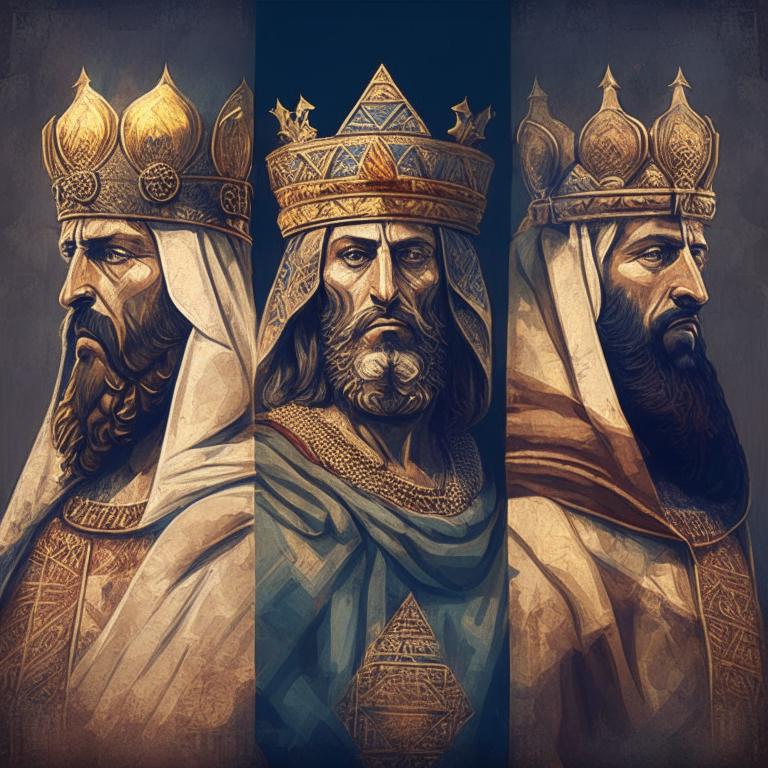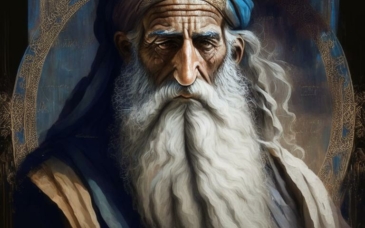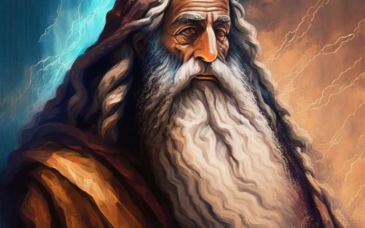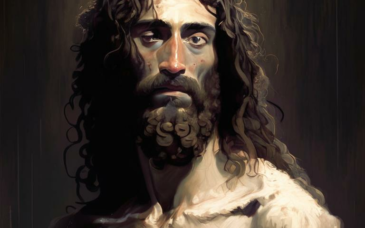Judah


Rehoboam

After Solomon died the people rebelled and the Nation was divided into the Northern Kingdom - Judah and the Southern Kingdom - Israel. In the south Rehoboam, the son of Solomon retained only the tribes of Judah and Benjamin for his kingdom, continuing to use Jerusalem as his capital. 1 Kings 11:43 He was forty one when he came to the throne, only one year before the death of David and reigned between 930-913 B.C. His name means 'he enlarges the people.'
Rehoboam's' refusal to relieve the tax burdens of the people, causes ten tribes to revolt. He prepares to fight against Jeroboam, the king chosen by the revolting tribes, but he is forbidden to do so. The calves are set up in Dan and Bethel, the priesthood thrown open to all the people, and a change made in the time of the feast of tabernacles. Ahijah, a godly prophet is sent to Bethel to prophesy against the altar. He is deceived by another prophet, and killed by a lion for his disobedience.
Judah provokes the Lord to jealousy and so sickness and death come upon Jeroboam's sons in judgment. The instrument of Gods choice is Egypt under Pharaoh Shishak in the fifth year of his reign. The prophet Shemaiah comes to Rehoboam and reveals that this attack is a punishment for forsaking the law of God and Rehoboam repents and humbles himself sparing his life but not before humiliation and loss. The remaining years of his reign appear to be prosperous but his overall reign is characterised by the words 'he did evil, because he prepared not his heart to seek the Lord.' 1 Kings 11:43-14:31
Abijah (3 Years)

Abijah or Abijam means 'Jah is my father' or 'my father is Yam' (or sea), may be a reference to the Canaanite god and may explain the change of name. He was the son of Rehoboam and the second king of Judah, who reigned from 913-911 B.C. He followed in the evil ways of his father Rehoboam 1 Kings 15:3 but kept the worship of Jehovah at Jerusalem. 2 Chronicles 13:10
He tried to unify the kingdoms by speaking to Jeroboam, King of Israel and also waging war against him. 2 Chronicles 13:15-20 He had fourteen wives who bore him twenty two sons and sixteen daughters. 2 Chronicles 13:21 He is listed as an ancestor of Jesus. Matthew 1:07
Asa (21 Years)
Asa means 'healer'. Asa was the third king of Judah and reigned for forty-one years from 901-869 B.C. 1 Kings 15; 2 Chronicles 14-16 His mother was Maacah. 1 Kings 15:10 An overview of his reign shows that he was a good king most of his reign, departing from the ways of the Lord in his later years.

During the period of early peace Asa took advantage of the time to reform the worship of Judah, fortify his cities and equip his army. 2 Chronicles 14:06-8 This ten years of peace was interrupted by an attack by the Ethiopian king Zerah. After inquiring of the Lord, Asa defeated Zerah's large army and powerful chariots. 2 Chronicles 14:9-15
At Jerusalem the people ratify the covenant with Yahweh, in the fifteenth year of his reign. Asa's religious reforms were so complete that he even dethroned his own mother, Queen Maacah for idolatry. Asa destroys the idols found in the Kidron valley. 2 Chronicles 15:16
When Baasha the king of Israel began to advance against Judah, Asa did not look to the Lord for help but rather paid for the support of Ben-hadad King of Aram and Damascus. Asa takes Ramah, and tears down the walls to fortify the cities of Geba and Mizpah. Jeremiah 41:9; 1 Kings 15:20-22

In his later years Asa drifted farther from God. He imprisoned Hanani, god's prophet for relying on the king of Syria rather than on the Lord and speaking against his unbelief. 2 Chronicles 16:07-10 Even in his old age when he suffered a disease of the feet, he still did not seek the Lord but rather the help of a doctor. This is significant as his own name means healer or doctor. He died in Jerusalem and was buried with a royal ceremony. 2 Chronicles 16:13-14
Jehosaphat (25 Years)
Jehosaphat followed Asa as the king of Judah at thirty five, and reigned for twenty five years from 872-848 B.C. His name means 'Yahweh judged' or 'Yahweh established the right.' Elijah and Elisha prophesied during his reign. While the book of Kings briefly mentions his reign, the book of Chronicles devotes four chapters to his accomplishments. 2 Chronicles 17-20
Jehosaphat fortified the cities along the northern boarder to protect Judah from attack by Israel. He continues the religious reforms of his father Asa, by destroying all the remaining high places of idol worship. It was said of Him that 'his heart was courageous in the ways of the Lord. ' 2 Chronicles 17:06 He took the covenant of God seriously and supported the keeping of law of God in every area of life. He sent his princes, priests and prophets throughout the land teaching the law in all her cities.
He made one mistake that led to his downfall. In his search for peace he made an alliance with Ahab, King of Israel. It was sealed in near eastern custom by a marriage of the two families. Athaliah daughter of Ahab and Jezebel, married Jehoram son of Jehoshaphat. Initially it was a benefit to both kingdoms but Athaliah's influence in Judah brought disaster in later years when she married Jehoram and led Judah into Baal worship.

In matters of civil rule, Jehosaphat appointed civil magistrates in every city, to distribute justice through the land. 2 Chronicles 19:5-11 He also established a kind of supreme court of justice in Jerusalem.
In 2 Chronicles 20:1-30 three nations attempt to drive Israel from the land. The Moabites, Ammonites and Edomites join forces against Judah. Judah and Jehoshaphat were driven to prayer and seeking the lords will, which came in the voice of the prophet Jahaziel. He stated that they would go up to the cliffs overlooking the enemy the next day and view the overthrow without lifting a hand. All the nations recognised this as the hand of God and left Judah alone for the rest of his reign. He ruled as a godly king whose downfall lay in his desire for peace and marriage to Israel.
Jehoram (8 Years)
After two godly kings Judah would fall back into idolatry under Jehoram. Although Jehoram means 'whom Yahweh has exalted' this king in the Davidic line was among the worst of the kings of Judah. His name can also be rendered Joram and the King of Israel during this same period had the same name. Also both had an Ahaziah connected to their reign. Joram of Judah was succeeded on the throne by his son, whose name was Ahaziah; Joram of Israel came to the throne at the death of his brother, who was also named Ahaziah. He reigned for eight years from 848-841 B.C.
He married Athaliah the daughter of Ahab of Israel, who brought with her the worship of Baal. This was her mother's fertility cult religion. The first act of his rule was to kill all of his own brothers and take their inheritance. God would punish Jehoram, with his instruments the Edomites as they broke away from his control. In accordance with the prophecy of Genesis 27:40 Edom would not be ruled by Judah, and successfully revolted against Judah. However they were not the only countries to revolt. The Philistines, Arabians and Cushites also revolted and Jehoram witnessed the deaths of all his children except one son Ahaziah, in accordance with the word of the prophet Elijah. 2 Chronicles 21:12-17 He also suffered a painful disease of the bowel which led to his death. He was refused burial by his people in the tomb of the kings.
A bad marriage can create much evil, even when the parents are godly and wise.
Ahaziah (1 year)
Ahaziah means, 'Whom Yahweh sustains.' In 2 Chronicles 21:17 he is called Jehoahaz. (Not to be confused with King Jehoahaz who reigned in 609 B.C.) He reigned for one year in ca. 841. Ahaziah had a nephew by the same name who reigned in Israel for two years. Athaliah, the mother of Ahaziah of Judah, was a wicked woman who promoted Baal worship in Israel.
During his one and only military expedition against Ramoth-gilead, Joram, the son of Ahab was wounded by Arameans. He fled to Jezreel to recover from his wounds. While Ahaziah went down to visit Joram, Jehu killed Ahaziah and his men. 2 Chronicles 22
Athaliah (7 Years)
Athaliah means 'Yahweh is righteous' or 'Yahweh is great'. She was Jehoram's wife and daughter of Ahab, the king of Israel and also the granddaughter of Omri. 2 Kings 8:18; 2 Chronicles 22:2 She ruled from 841-835 B.C. and married Jehoram the son of Jehoshaphat of Judah. Israel and Judah were at peace at that time, however the marriage was a great mistake because she carried on in her mother, Jezebel's tradition of Baal worship. After the death of her son, she had all the male heirs to the throne killed except Jehoash, who was hidden by his aunt, Jehosheba. 2 Chronicles 22:11 She took the throne for seven years and became the only woman in Israel history to do so.
Jehosheba's husband Jehoiada, the priest, led a revolt, against her in her seventh year. He had Joash proclaimed king and when Athaliah tried to stop him she died in the arms of the temple guards. 2 Kings 11:5-20
Joash (40 Years)
Joash means 'Yahweh gives' and reigned from 835-796 B.C. Joash had escaped the destruction of his family by Athaliah. He was kept hidden in the temple until he was six years old. 2 Chronicles 22:10-12 During this time Athaliah ruled the land. He was only seven when the High Priest, Jehoiada brought him out from hiding and anointed him king. Athaliah was killed and under the High Priest's leadership, a partial reform took place in Judah. The temple of Baal was destroyed, and the Lord's temple was restored through thank offerings brought by the people.
The reign of Joash is not distinguished, but has a positive influence while the priest Jehoiada is alive. At the priest's death, Joash allowed pagan worship again. The prophets protested and he killed Zechariah, Jehoiada's son. He was wounded in a battle against King Hazael of Syria and upon returning home was assassinated by men of his own court. The greatest achievement of Joash was the rebuilding of the temple and a restructuring of the collection of temple taxes which kept them from being misused by the priests. This was a popular move with the people. 2 Kings 12:13
Amaziah (29 Years)
Amaziah means 'Strength of Yahweh'. He was the ninth king of Judah, the son of Joash and father of Uzziah who reigned from 796-767 B.C. He was 25 years old when he came to the throne. He avenged the murder of his father, who had been killed by court servants. But Amaziah didn't kill all of their household only the guilty parties. 2 Kings 14:5-6
His reign was characterised as 'doing that which was right in the eyes of the Lord' but idolatry still flourished secretly in Judah. He required all men over 20 to be conscripted into Judah army. He defeated the Edomites to the south but sinned in taking Edomite Idols back to Jerusalem to worship. He refused to listen to the words of the prophets and made war against the powerful army of Jehoash (Joash), king of Israel. 2 Kings 14:8-14; 2 Chronicles 25:17-24 Jehoash overtook Jerusalem, penetrating her walls, plundering the temple and royal palace and taking Amaziah prisoner. Amaziah outlived Joash but had to run for his life because of a conspiracy against him. On his way to Lachish but was murdered.
Aariah or Uzziah (52 Years)
Azariah means 'Yahweh has helped.' Uzziah means 'Yahweh is might.' His name may have been changed when he took the throne. He reigned in Judah from 792-740 B.C. 2 Kings 15:1-27 He was the son of King Amaziah of Judah. The people brought him to the throne when he was just sixteen years old following his fathers murder. 2 Kings 14:21; 2 Chronicles 26:1 He reigned for fifty two years and was known as a king who feared the Lord and did wisely in the sight of God.
The first order of business was to deal with his fathers enemies the Edomites, who revolted against Judah during Jehoram's reign. He conquered the land as far south as Elat (Eloth), the strategic port on the gulf of Aqaba. 2 Kings 14:21; 2 Chronicles 26:1 His other campaigns included the Mehunim, or people of Maan, and the Arabs of Gurbaal. In the west Uzziah waged a successful campaign against the Philistines, levelling to the ground the walls of some of their most important cities, Gath, Jabneh, and Ashdod. Then he fortified some of the cities in the Philistine region.

He strengthened the walls of Jerusalem and some of her towers. 2 Chronicles 26:9 He provided wells for the herds in the desert, erected watchtowers for protection of vineyards and rebuilt the copper and iron mines which had not been used since Solomon's day.
Uzziah was so successful because he was faithful to the Lord. The Prophet Zechariah was a great help and advisor to him during his reign. 2 Chronicles 26:5
Uzziah's downfall came when at the height of his success, he presumes to enter the Temple and burn incense on the altar of God. The High priest Azariah and eighty others confront Uzziah and as he pressed forward to the altar, he was struck with leprosy. Disobedience, pride and anger led to the downfall of a great Godly king. As a result of his disease he was banned from his palace, society and the temple, he was denied a royal burial and was simply buried in a field. 2 Chronicles 26:23 His son Jotham reigned while Uzziah was banished from society.
A serious earthquake stuck the land of Judah during his reign. Amos 1:1; Zechariah 14:5 Josephus has suggested that this was as a result of Uzziah's sin but it is uncertain. Although Uzziah lived all of his life as a Godly king who brought great prosperity to Judah, it is his one sin for which his is most often remembered. He has been nicknamed the 'leper king.'
Jotham (16 Years)
Jotham means 'Yahweh has shown Himself to be perfect.' His mother's name was Jerusha. He took the throne while his father, Uzziah as king of Judah, suffered from leprosy from 750-732 B.C. Jotham was twenty fife years old when he took the throne. 2 Kings 15:32 It is likely that his father ruled from the sidelines during his leprosy. Ten years later Uzziah died and Jotham took complete control of Judah. It was in the year that King Uzziah died that Isaiah was called to be the prophet of Israel. Isaiah 6 Hosea and Micah also prophesied during his reign.
Jotham was involved in only one military campaign east of the Jordan. He conquered Ammon and made them pay a heavy tax to Judah. He is noted for his building projects of towers, walls and cities, among which is the Ophel wall in Jerusalem which is still visible today. One of the great achievements was the completion of the upper gate in the temple, which was started over 150 years earlier, during Asa's reign. 2 Kings 15:35
Ahaz (16 Years)
Tablet of Tiglath-Pileser III of Assyria. Clay table giving the history of the first 17 years of the reign of Tiglath -Pileser III, from Nimrud. Names Jehoahaz, king of Judah, as bringing tribute. Presently in the British Museum.
Ahaz is a short form of Ahaziah and means 'Yahweh upholds'. During his reign (732-715 B.C.) Judah sank to the level of the wicked idolatrous practices of the Assyrians. 2 Kings 16:3 Isaiah and Micah prophesied during his reign. When Rezin, king of Syria and Pekah, king of Israel waged war against Judah, instead of trusting in God as Isaiah had told him, Isaiah 7-9 he took money from the temple treasury to purchase help from the Assyrians. 2 Chronicles 28 In doing so he adopted the Assyrian religion. 2 Kings 16:10 Isaiah declared that the real enemy was not Syria or Israel but the Assyrian's in whom he had trusted. Isaiah 7:12 The result was that Judah came under the domination of Tiglath-Pileser III of Assyria. Ahaz made an altar after the pattern of the Syrians and had it placed in the Temple. 2 Kings 16:11 He died in disgrace and was not buried in the tomb of the kings in Jerusalem. 2 Chronicles 28:15
Hezekiah (29 Years)

Taylor's Prism Describes Sennacherib's attack on Juaha in 701 B.C. States 'as for Hezekiah, the awful splendor of my lordship overwhelmed him.' Found in the ruins of His palace in Nineveh.

Annals of Sargon II Describes Sargon II conquest of Samaria in 722-721 B.C., from Khorsabad. Presently in the British Museum. 2 Kings 17:6
Hezekiah means 'Jehovah is strength'. Hezekiah reigned from 715-686 B.C. The northern kingdom had just fallen to the Assyrians in 722 B.C. Hezekiah was only twenty five when he came to the throne but was not to follow in his father footsteps. He set out to reform the religion of Judah and purge the temple of idols. He called upon the Levites to clean up the temple in preparations for worship. The worship and sacrifices were started up again. The Passover was reinstituted and an invitation even went out to the Northern Kingdom of Israel to participate in the event at Jerusalem. Even the bronze serpent of Moses which had been worshipped by the people was taken down and destroyed. Numbers 21:4-9; 2 Kings 18:4

In 711 B.C., just a few years after Hezekiah had become king, Sargon II of Assyria captured Ashdod. In response Hezekiah began a defence program against an Assyrian invasion. Apart from trusting in the Lord he fortified cities and built the Hezekiah Tunnel discovered in 1880. The tunnel connected the Pool of Siloam with the spring of Gihon. This would insure that Jerusalem had sufficient water supply in case of a siege. It was a monumental task taking Judean workers through 1,777 feet of solid rock.

Ten years later, the Assyrians did invade Judah after having taken Israel into captivity. As the Assyrians invaded city after city, Hezekiah sent word to Sennacherib King of Assyria at Lachish stating that he would pay him a heavy tax if he left them alone. 2 Kings 18:13 The tax was so great that Hezekiah had to strip the temple and palace of its gold to make the payment.
But it was all to no avail as Sennacherib came back and demanded an unconditional surrender. Against the proud and arrogant boast of the Assyrians, Hezekiah humbly trusted the Lord. 2 Kings 19:21-22 He sent word for Isaiah to intervene and give direction. With both his trusting in the Lord and his well laid preparations were enough to hold off the Assyrians. 2 Kings 19:7 God sent a plaque and 185,000 Assyrians died in one night. Sennacherib returned home depressed and discouraged where he was killed by two of his own sons. God caused the Babylonians to revolt against the Assyrians and a result Jerusalem was spared.

It was around this same time that Hezekiah fell sick, in fact Isaiah the prophet told him to put his house in order in preparation for his death. But as a result of his ernest prayer recorded in Isaiah 38, Hezekiah was granted recovery and another fifteen years. He died in 686 B.C. after leading Judah in one of her greatest revivals in her history.
Manasseh (25 Years)

Ashtoreth or Asherah Asherah figuraine, made from a mold discoverd at Nahariyeh, Israel. Goddess of the sea and Baal's mother. Manasseh king of Israel introduced it into worship.
Manasseh means 'God has caused me to forget'. Genesis 41:51 His was the longest and wickedest reign in Judah's history. (697-642 B.C.) He was only twelve years old when he came to the throne but wasted no time in plunging Judah into idolatry by erecting altars to Baal and even causing his sons to pass through the fire in the Valley of Hinnom. He set up the idols of Ashtoreth or Asherah in the temple of Solomon which was built for Jehovah. God sent warning but to no avail and so Judah would be taken into captivity as a result of the sin of Manasseh. 2 Kings 21:10-16; 2 Kings 24:3,4 Even the reforms of his grandson Josiah could not turn things around. 2 Kings 23:06,12
Sennacherib's son Esarhaddon carried Manasseh off captive, causing Manasseh to cry out to the Lord. God heard his cry and brought him back to Jerusalem where he tried to turn things around spiritually in the land but to no avail. His earlier damage had become too rooted in the life of the People to be changed. When he died he requested that he be buried in the garden of his own house, indicating that he was not worthy to be buried with the other kings of Judah.
Amon (2 Years)
Amon means 'faithful or workman.' He only reigned for two years from 642-640 B.C. Amon followed in the idolatry of his father Manasseh. 2 Kings 21:19-23; 2 Chronicles 33:21-26 He was killed in a palace conspiracy and his eight year old son was crowned king. He is listed among the descendants of both David and Christ. 1 Chronicles 3:14; Matthew 1:10
Josiah (31 Years)
Josiah means 'Yahweh supports or heals.' He was a godly king who came to the throne when he was only eight years old but ruled for thirty one years from 640-609 B.C. 2 Kings 22:1; 2 Chronicles 34:1

At the age of sixteen he began earnestly seeking the Lord, and by twenty he was ready to begin religious reforms. He began by removing the high places, the Asherah, and the altars to Baal.
For Further Study see Religion of Israel
In his eighteenth year during the repairs to the temple the 'Book of the Law' was found by Hilkiah, the high priest. 621 B.C. The temple and the book of the law had been neglected since the days of Manasseh. Shaphan, the scribe, read it to King Josiah who repented and understood that Judah had been disobedient to the covenant of the Lord and called all the leaders of Judah to Jerusalem to hear the law of God publicly read. 2 Kings 22:8-20; 2 Chronicles 34:15-28
Six year latter Jeremiah is called to his prophetic ministry in 627 B.C. The first twenty chapters of the book of Jeremiah are concerned with the reign of King Josiah. While Josiah's reforms were the most widespread and significant in Judah's history they still were not enough to change the hearts of the people as is evident for Jeremiah's message. Josiah's reforms were only external reforms and God did not turn from his anger because of Judah's sin.
Josiah died in battle against the armies of Egypt under Pharaoh Neco. Neco was on his way to Assyria to help them fight against the Babylonians. Josiah was killed at Megeddo. He is lamented by Zechariah. Zechariah 12:11; 2 Chronicles 35:24-25 Although a young man when he died (39), he is remembered as one of Judah's greatest kings. 2 Kings 23:25
Jehoahaz (3 Months)
Tablet of Tiglath-Pileser III of Assyria Clay table giving the history of the first 17 years of the reign of Tiglath -Pileser III, from Nimrud. Names Jehoahaz, king of Judah, as bringing tribute. Presently in the British Museum.
Jehoahaz means 'Yahweh upholds'. The account of the Kings is complicated by the fact that two kings of Judah and one king of Israel have this name. Upon Josiahs death Pharaoh Neco set Jehoahaz up as the puppet king. He only reigned for three months in 609 B.C. when he was taken to Egypt by Pharaoh Neco never to be heard from again. 2 Kings 23:29, 30
Jehoiakim (11 Years)
Jehoiakim means 'Yahweh set up'. His name was originally Eliakim 2 Kings 23:34, but was changed by Pharaoh Neco of Egypt, to Jehoiakim. He reigned for eleven years from 609-598 B.C. He was placed on the throne by the Egyptians and was subject to them until 605 B.C. when Pharaoh Neco was defeated by the Babylonians at the battle of Carchemish.
The prophet Jeremiah wrote against Jehoiakim with charges of corruption, idolatry, extortion, Luxury and other grievous sins. Jeremiah 22:13 ff. With Egypt to the south and Babylon in the north, Judah was caught in the middle. If she would not repent then God would bring Judgment even worse than the bondage she was presently under with the Egyptians. This was fulfilled in 605 with the invasion of the Babylonians and the defeat of the Egyptian Pharaoh at Carchemish.
Jehoiakim changed his allegiance to the Babylonians but rebelled within three years, holding back his tribute money he owned. Jeremiah strongly urged Jehoiakim not to do this but he would not listen. Shortly after Jerusalem was sieged and taken, Jehoiakim was killed his body displayed outside the city walls in accordance with the prophecy of Jeremiah. Jeremiah 22:18, 19 The Babylonian's placed another puppet on the throne of Judah, Jehoiachin who only lasted three month.
Jehoiachin (3 Months)

Babylonian Nations Record Babylonian Nation Records mentining Jehoiachin, his sons and the men of Judah.
Jehoiachin means Yahweh establishes.' Jehoiachin's original name was Jeconiah or Coniah. Ezekiel 1:2 He only reigned for three months and ten days. He was only eight when he came to the throne late in 598 B.C. 2 Chronicles 36:9 In revenge for his father's alliance with Egypt, Nebuchadnezzar invaded Judah and took many from Judah back to exile. Along with the rich and strong, Nebuchadnezzar also took back with him the riches of the temple treasury only leaving a poor remnant behind. Jehoiachin was not only taken into exile but imprisoned and there he remained for nearly all of his life. After thirty six years he is released from prison by the Evil Merodach of Babylon, and given a place of some importance, but would never return to Judah to take the throne. 2 Kings 25:27-30 The prophecies of Ezekiel and Daniel correspond to this period of history.
Zedekiah (11 Years)
Babylonian Chronicles Babylonian Chronicles tellin gof the Fall of Jerusalem to Nebuchadnezzar in 597 B.C.
Zedekiah means 'Yahweh is my righteousness' or 'Yahweh is my salvation.' 2 Kings 24:17-25:07 He was the son of Josiah by his wife Hamulal, and brother of Jehoahaz. He is the last king of Judah who ruled from 597-586 B.C. His name was originally Mattaniah but was changed by Nebuchadnezzar when he set him up as the king, following his invasion and carrying his Nephew Jehoiachim into captivity in Babylon. 2 Kings 24:17 He was only twenty one when he was given the throne.
From the beginning of his reign pressure was placed upon him from within and without to join the Egyptians in a rebellion against the Babylonians. Jeremiah 39:1-7; 51:59; 52:1-11 Eventually Zekekiah gave in and formed and alliance with Egypt. This brought a swift and sure invasion of Nebuchadnezzar who besieged Jerusalem for sixteen months before capturing it and destroyed it in 586 B.C. All of the riches of the temple were carried off to Babylon. Jeremiah lived during this time and wrote the book of Lamentations to lament the ruin of the beloved city of Jerusalem.
All of Judah was taken except Lachish and Azekah. Jeremiah 34:7 Many of the Jews who remained fled to Egypt for protection. Zedekiah along with his family were taken to Riblah. Here in Riblah, Zedekiah witnessed the executions of his sons before his own eyes were blinded. 2 Kings 25:7 Then Zedekiah was taken to Babylon. He died in captivity.
Israel
Jeroboam I (22 Years)

After Solomon died the people rebelled and the Nation was divided into the Northern Kingdom - Judah and the Southern Kingdom - Israel. In the North Jeroboam I ruled over the ten tribes that rebelled and took as his capital Bethel.
Jeroboam's name means 'he who contends for justice for the people' or 'may the people multiply.' He ruled the Northern Kingdom of Israel from 930-909 B.C. He began his career under Solomon's reign as his building manager. 1 Kings 11:28 At this time Ahijah, a prophet from Shiloh, confronted Jeroboam, tore his own coat into twelve pieces, and gave ten of them to Jeroboam. This was to indicate that ten of the twelve tribes were to be ruled by Jeroboam. 1 Kings 11:29-39 Jeroboam tried to take the kingdom at once which failed and he had to flee to Egypt where he was kindly treated by Pharaoh Shishak.
After Solomon's death, Jeroboam returned to learned that the tribes would meet at Shechem to make Solomon's son Rehoboam their king. The southern Kingdom of Judah took Rehoboam as their king, but the ten tribes were unhappy with the harsh treatment and high taxes and Jeroboam used this to sway the people. He promised to lighten the load but never delivered. Unknowingly the ten tribes revolted against the house of David and crowned Jeroboam as their king. He set up his royal residence at Zeredah.
It did not take long for Jeroboam to lead the people astray. It bothered him that the temple in Jerusalem, outside of his territory, was supposed to be the religious centre for his people. So he established a centre of worship of his own at Bethel and Dan , erecting a golden calf to represent God's presence. 1 Kings 15:26,34; 16:19, 31
He also appointed men to carry out the cultic activities who were not from the tribe of Levi. He introduced his own calendar of festivals and personally served as High priest. 1 Kings 12:25-33 While he was at the altar, he was approached by a prophet form Judah ,who told him that a future king from David's line, named Josiah would sacrifice Bethel's priests on that very altar. And a sign was given, the altar split and the ashes fell off it.

He fortified Shechem and made it his capital but later moved it to Tirzah. 1 Kings 14:17 When Pharaoh Shishak invaded Judah in the south he also made inroad into the northern kingdom which is evident from the inscription on the temple at Karnak, which gives a list of the towns captured by him.
When the prophet Ahijah was old and blind, Jeroboam sent the queen to inquire about an illness that had taken the king's oldest son. The queen went in disguise but could not fool God who reported through his prophet that the people he had seduced into idolatry would be uprooted and taken beyond the river and that his son would not live. Jeroboam died leaving behind a heritage of idolatry that would affect all of the other kings of Israel.
Nadab (2 Years)
Nadab means 'liberal' or willing'. Following his father's death, Nadab took the throne and ruled from 909-908 B.C. During a siege of the Philistine city of Gibbethon, Baasha assassinated him and exterminated all the rest of his house. 1 Kings 15:25-28 It is seen as a fulfillment of Ahijah's prophesy. 1 Kings 14:10-11
Baasha (24 Years)
Baasha means 'boldness'. He is the son of Ahijah of the tribe of Issachar. 1 Kings 15:27 He reigned over Israel for twenty four years from 908-986 B.C. Although he had a lengthy reign little is known about him. He carried on a long warfare with Asa, King of Judah. 1 Kings 15:16 He tried to strengthen the fortress of Ramah but was prevented from completing the project because of war with Asa and Ben-hadad, king of Syria. 2 Kings 15; 2 Chronicles 16
Jehu the prophet told Baasha that he and his family would be destroyed. Even his son Elah who followed him as king was assassinated by Zimri. God was giving a warning to the following generations of the consequences of idolatry and covenant unfaithfulness.
Elah (2 Years)
Elah means 'mighty tree', 'chief' or 'strong'. He had a brief reign of two years over Israel from 886-885 B.C. His army was engaged in a battle with the Philistines, laying siege to the city of Gibbethon, but Elah remained in his capital Tirzah. While he was drunk he was assassinated by Zimri, his general, who only ruled himself seven days. 1 Kings 16:06-14
Zimri (7 Days)
Zimri means 'Yahweh is my protection'. Zimri was Elah's general over his chariots. While Elah's army was took the throne engaged in a battle with the Philistines, laying siege to the city of Gibbethon, Elah remained in his capital Tirzah drinking at a party. While he was drunk he was assassinated by Zimri. 1 Kings 16:06-14 Gibbethon's defeat under Omri was quick and upon returning to Tirzah, Zimri could not hold his army off and retired to his house and burned it over his own head. He only lived seven days.
Omri (12 Years)
Omri's meaning is uncertain but some have suggested 'Yahweh apportions'. Omri ruled from 885-874 B.C. He founded the dynasty of Omri which ruled from 885-841 B.C. He came to the throne by invading the capital and taking control of the palace. Zimri committed suicide rather than be taken captive. 1 Kings 16:8-15 Although half of the people supported Omri as king, he still had to put down a rebellion led by Tibni and his own brother Joram. Civil war raged for four years until both Tibni and Joram were killed. 1 Kings 16:15-23
Omri reigned for six years at Tirzah until he moved the capital to Samaria . He purchased the hill for two talents of silver, from a rich man. It became a place of open idolatry. Here he reigned for a further six years promoting and international policy with foreign countries that established Israel's prestige. Micah accused Jerusalem of following his leadership and promised that God would destroy Jerusalem. Micah 6:16
Ahab (22 Years)
Ahab is the compound name for 'Father and brother'. Ahab had married a foreigner, Jezebel, who brought with her idolatry. Ahab reigned for twenty two years from 874-853 B.C. He expanded the political and commercial interest of Israel but failed in the spiritual area of Israel's obedience to the covenant. 1 Kings 16:30
Ashtoreth or Asherah Asherah figuraine, made from a mold discoverd at Nahariyeh, Israel. Goddess of the sea and Baal's mother. Manasseh king of Israel introduced it into worship.
Ahab's wife, Jezebel, was the daughter of the king of Tyre. 1 Kings 16:31 His marriage had been arranged by his father Omri as a political move to strengthen Israel's place in world politics, but it brought the house of Israel down in idolatry. Jezebel worshipped the Tryian God melqart, and promoted the worship of Baal in Israel by supporting 450 Baal prophets and 400 prophets of the goddess Asherah. 1 Kings 18:19 Baal worship was introduced into the temple at Samaria . She even lived ten years beyond King Ahab's reign exercising a negative influence on Israel's spiritual life.
Ahab sought piece with Judah through the marriage of his daughter Athaliah to Joram king of Judah. It produced co-operation between the two Kingdoms, which resulted in the recapturing of Ramoth-gilead but not before taking his life. 1 Kings 22:2-40
His military campaigns included the control of the Moabite people which is recorded on the famous Moabite Stone. He was also involved in three campaigns with the Syrian king, Ben-hadad. His name is mentioned on an inscription of Shalmanezer III of Assyria. The inscription states that Ahab sent 2,000 chariots and 10,000 men into battle.
King Shalmaneser III Assyrian king who reigned from 858-824 B.C. First Assyrian King to invade Israel.
But God did not abandon Israel. God raised up the 'troubler of Israel' in the prophet Elijah. He called Israel back to the service of Yahweh and after three and a half years of drought, Elijah challenged the prophets of Baal on Mt. Carmel, and destroyed them around the altar that day. Ahab is confronted at Naboth's vineyard which had been unjustly taken by Ahab. Elijah placed a curse on the Omri Dynasty, and prophesied that he would be destroyed in battle. So he would not be recognised by the Syrians in battle, Ahab disguised himself, but a stray arrow pierced his armour and he died on his way back to Samaria in his own chariot.
Ahaziah (2 Years)
Ahaziah means, 'Whom Yahweh sustains.' He was Ahab's son and only ruled for two years from 853-852 B.C. Little is written about this king except that he followed in the evil tradition of idolatry . He worshipped the golden calves and served Baal. 1 Kings 22:52-53 He joined Jehoshaphat of Judah in a naval project to re-establish Ezion-geber as a trading port. Jehoshaphat pulled out from warning by the prophets. 2 Chronicles 20:35-37; 1 Kings 22:48-49
Ahaziah fell in his palace and became ill. He looked for help from Baal -zebub, the god of Ekron. Elijah heard of it and intercepted the message and sent his own message of doom. Ahaziah tried twice to have Elijah arrested but each time fire consumed the soldiers. On the third try, the soldiers pleaded for mercy and Elijah delivered the message himself. 2 Kings 1:2-17
Joram (12 Years)
Joram means 'whom Yahweh has exalted' His name can also be rendered Jehoram and the King of Judah during this same period had the same name. Also both had an Ahaziah connected to their reign.
Although Joram ruled for twelve years the account of his deeds is briefly recorded in 2 Kings 3. While he got rid of the altars of Baal, his sin was that of Jeroboam in worshipping the Asherah poles. 2 Kings 3:3 During his reign he waged war against Moab, with the help of Judah and Edom.
Joram has received a wound in battle and was recovering at Jezreel, when Elisha sent his servant to anoint Jehu the king of Israel. He was the commander of the army, and declared that he was king and killed Joram of Israel and Ahaziah of Judah. 2 Kings 9:14-29 Jehu saw to it that Elijah's words of judgment on Omri's household came true, all were killed.
Jehu (28 Years)
Jehu means 'Yahweh is He'. The Son of Jehoshaphat and king of Israel, who reigned from 841-814 B.C. He rose to the throne through the word of the prophet Elisha, and by killing all of Ahab's household, including Joram, Jezebel and seventy members of Ahab's house.
Jehu showed great craftiness in destroying the worshippers of Baal. Stating that he was a more zealous follower of Baal than even King Ahab, he announced a special festival that only the devoutest followers of Baal should attend. Following the sacrifice in the temple, Jehu's army sent in and put all to the sword. Although he eliminated the service of Baal and Jezebel, 2 Kings 10:28 he did nothing however about the worship of the golden calf at Bethel.
Jehoahaz (17 Years)
Jehoahaz means 'Yahweh upholds'. Two other kings of Judah had the same name. Jehoahaz reigned in Israel for seventeen years from 814-798 B.C. Part of his reign may have been with his son. Jehoahaz temporarily turned to God for relief from the pressure of the invading nations, but did not depart from idolatry or destroy the images of the gods in Samaria. 2 Kings 13:1-9 When once Ahab had two thousand chariots, now Jehoahaz only had fifty horseman and ten chariots. 2 Kings 13:7
Jehoash (16 Years)
Jehoash means 'Yahweh supports'. It is also spelled Joash, and can be confusing because Joash king of Judah ruled during the same period. Jehoash ruled the throne for sixteen years from 798-782 B.C. The nation of Israel was in a very poor condition economically when he came to power. The many conquests that had been gained by Hazael, king of Syria, had left the land weak and without resources.
Jehoash revived Israel for a time but it was only political. Jehoash visited the dying Elisha who told him that he would win three victories over Syria. 2 Kings 13:14-19 In the subsequent battles Jehoash was successful over Syria and even Judah to the south. In the Battle at Beth-Shemesh he defeated Amaziah of Judah and went on to enter Jerusalem and plunder the temple. Although he inquired of Elisha the prophet he did not serve Jehovah.
Jeroboam II (41 Years)
Jeroboam's name means 'he who contends for justice for the people' or 'may the people multiply.' Jeroboam II was perhaps the most outstanding King in the Northern Kingdom, ruling for forty one years, twelve of them with his father from 793-753 B.C. He regained much of the territory that had been lost in previous conflicts under Jehu and Jehoahaz. 2 Kings 13:17-25 He was able to conquer the Syrian capital of Damascus recapturing the eastern boundary of the Kingdom as it was in the days of David. 1 Chronicles 13:5 Wealth and prosperity flowed into Israel like it had never seen since the days of Solomon. The books of Amos, Hosea and Jonah all recount the peace and prosperity.
There was also religion in the land but not the kind which God wanted. The Israelites continued in the sins into which Jeroboam I had led them. Hosea 8:4-6 There was form and structure but no substance. Amos went to Bethel and spoke out against the golden calves and Jehovah would punish the household of Jeroboam. Amos 7:9-17 Jeroboam was succeeded on the throne by his weak son Zechariah.
Zechariah (6 Months)
Zechariah means 'Yahweh is renowned or remembered'. He was the son of Jeroboam II and only ruled over Israel for six months in the year 746 B.C. He was murdered by Shallum. 2 Kings 15:8-12
Shallum (1 Month)
Shallum means 'replacer or recompenser'. He was the son of Jabesh. Shallum who killed Zechariah was himself assassinated after only one month of reign by Menahem son of Gedi in 746 B.C. 2 Kings 15:10-15
Menahem (10 Years)

Tablet of Tiglath-Pileser III of Assyria Clay table giving the history of the first 17 years of the reign of Tiglath -Pileser III, from Nimrud. Names Jehoahaz, king of Judah, as bringing tribute. Presently in the British Museum.
Menahem means 'comforter'. 2 Kings 15:14-22 Menahem was a military leader who avenged the death of Zechariah by killing Shallum. He took the vacant throne for himself. 2 Kings 15:10-14 Menahem ruled for ten years from 752-742 B.C. giving tribute to the Assyrian ruler Tiglath-Pileser III as did Pekahiah. The Assyrian King may have had a hand in obtaining the throne for Menahem.
Hosea and Amos paint a picture of lawlessness and sin within Israel during this period. He continued the worship of the golden calf and even went so far as to destroy one of his own cities because of resistance to his authority. 2 Kings 15:16 This period led to the fall of the Northern Kingdom by the invasion of the Assyrians who took over the land of Palestine. Sin is always punished by God.
Pekahiah (2 Years)

Pekahiah means 'Yahweh watches'. He was king of Israel from 742-740 B.C. Like Menahem, Pekahiah paid tribute to the Assyrian ruler Tiglath-Pileser III. He was merely a puppet king of the Assyrians. 2 Kings 15:23 With growing opposition from within Israel, Pekahiah was assassinated by Pekah, one of his army officers. 2 Kings 15:25 Pekah was supportive of the Syrians who opposed to the Assyrian strength.
Pekah (20 Years)
Pekah means watchfulness'. Pekah, a military official came to power by killing Pekahiah and ruled from 752-732 B.C. 2 Kings 15:25 Pekah joined forces with the Syrian king Rezin to resist the Assyrians. Israel tried to obtain the assistance of Judah to help suppress the Assyrians but they would not. 2 Kings 16:5-9 The Assyrians invaded Damascus in 732 B.C. and conquered Syria killing Rezin. The Israelites in turn killed Pekah and set Hoshea on the throne.
Hoshea (9 Years)
Ironically Hoshea means 'Yahweh is salvation or deliverance'. It was during his reign that they were delivered but into the hands of the Assyrians. Hoshea ruled under Assyrian domination for nine years from 732-722 B.C. Hoshea had no choice but to be obedient to the Assyrians and pay tribute to them.
However in 727 when Shalmanezer V came to the throne in Assyria, Hoshea stopped his payments to Assyria and turned to Egypt for help rather than the Lord. Egypt was not strong enough to help, and Shalmanezer rushed into Israel and besiege Samaria the Capital. Samaria held out for three long years before it fell to the Assyrians.

During this time Shalmanezer died and Sargon II took the throne of Assyria. The entire nation was carried off to Assyria in captivity. The prophets had made their voices known but Israel would not listen. Amos 5:2 Israel had lowered themselves to the worship of Molech and Baal, Canaanite gods. 2 Kings 17:14-5 Under Shalmanezer and Sargon, Israel came to an end as a nation.







